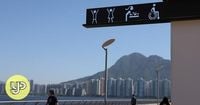In a landmark ruling on July 23, 2025, a Hong Kong judge struck down regulations criminalizing the use of public bathrooms designated for the opposite sex, affirming the rights of transgender individuals to access facilities matching their gender identity. The decision, delivered by Judge Russell Coleman, marks a significant advance in transgender rights within the city, a financial hub known for its complex intersection of traditional values and progressive legal battles.
Judge Coleman approved the judicial review brought forward by an individual identified only as "K," who was born female but identifies as male. K challenged the existing Public Conveniences (Conduct and Behaviour) Regulations, which currently prohibit individuals aged five and above from using public toilets not aligned with their biological sex at birth. Violations of this regulation can result in fines up to 2,000 Hong Kong dollars (approximately $255).
In his judgment, Coleman emphasized that the regulations contravene an article of Hong Kong’s mini-constitution, the Basic Law, which guarantees equality before the law to all residents. He criticized the practice of "drawing the line of a person's biological sex at birth" as creating "a disproportionate and unnecessary intrusion into the privacy and equality rights" of transgender people.
However, the judge suspended the effect of the ruling for one year, giving the government time to consider how to respond to the decision. Coleman noted that determining the legal boundaries between "female person" and "male person" is a matter best suited for the legislature or government, not the courts. "This is a matter of line-drawing, which seems to me to be a question for the government or legislature to address," he wrote.
The Public Conveniences (Conduct and Behaviour) Regulations, drafted in the 1960s, were originally designed without consideration for transgender identities, a fact highlighted by both the court and K’s legal team. K, who began the legal challenge in 2022, sought to expand the exemption currently granted only to children under five accompanied by an opposite-sex adult, to include pre-operative transgender individuals diagnosed with gender dysphoria and undergoing a medically supervised process of living in their identified gender. K’s counsel, Tim Parker SC, underscored the mental health challenges faced by transgender people, noting that K often limited water intake outdoors to avoid using public toilets and potentially facing legal repercussions.
The government’s Environment and Ecology Bureau responded to the ruling by stating it would carefully study the judgment and consult with the Department of Justice on appropriate follow-up actions. The government retains the right to appeal the decision within 28 days.
Advocacy groups have warmly welcomed the ruling. Quarks HK, a group supporting transgender youth, described the judgment as "not just an affirmation of transgender rights legally but also a big step forward for Hong Kong's overall human rights development." They urged officials to take immediate action to rectify long-standing discrimination and to increase gender-friendly public facilities.
Mark Daly, principal at Daly and Associates—the law firm representing K—called the ruling a "significant milestone in the advancement of transgender rights in Hong Kong." Daly emphasized that "the burden of defending basic rights should never fall on those already facing systemic barriers," and urged the government to proactively review discriminatory laws to ensure public spaces are safe, inclusive, and accessible to all, regardless of gender identity.
This ruling follows a series of recent legal and policy shifts in Hong Kong concerning LGBTQ+ rights. In 2023, the city’s top court ruled that full sex reassignment surgery should not be a prerequisite for transgender people to change their gender markers on official identity cards. Subsequently, in April 2024, the government revised its policy to allow individuals who have not completed full gender-affirmation surgery to change their gender on ID cards, provided they meet certain conditions.
These conditions include the removal of breasts for transgender men, removal of the penis and testes for transgender women, and undergoing continuous hormonal treatment for at least two years before applying. Applicants must continue hormonal treatment and submit blood test reports for random checks upon government request. Despite these reforms, some activists argue that the requirements remain restrictive. Henry Tse, a transgender activist who won a legal battle in 2023 and received a gender-reflective ID card in 2024, lodged a fresh legal challenge in April 2025 over the new requirements, seeking further easing of the conditions.
The recent court ruling also coincides with broader moves by Hong Kong’s government to recognize same-sex partnerships formed overseas, proposing a registration system that would grant such couples additional rights within the city.
Judge Coleman’s ruling explicitly acknowledges the evolving understanding of gender identity and the need for laws to reflect contemporary social realities. He noted that the existing criminal offence for using bathrooms designated for the opposite sex might be redundant, as other legal provisions could address improper conduct in public facilities. This pragmatic approach suggests the government might consider decriminalizing such acts altogether or amending the regulations to be more inclusive.
For K and many others in Hong Kong’s transgender community, the ruling offers hope for greater dignity and equality. K stated, "Today, I and other transgender friends who are still in the process of gender transition can use public toilets openly without fear of being rejected." This sentiment encapsulates the broader struggle for recognition and respect faced by transgender individuals in a city balancing tradition and progress.
Hong Kong’s judicial system appears poised to become more inclusive, reflecting shifting societal attitudes and legal precedents. Yet, as Judge Coleman pointed out, the ultimate responsibility for defining the legal distinctions around gender lies with lawmakers. The coming year will be crucial as the government decides how to implement this ruling and potentially reshape policies affecting transgender rights.
In the meantime, advocacy groups continue to press for expanded protections and social acceptance. The ruling stands as a beacon for transgender rights in the region and a call to action for governments worldwide to reconsider outdated laws that marginalize vulnerable communities.






